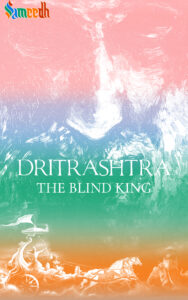Dhritarashtra is a central character in the Hindu epic, the Mahabharat. He is the eldest son of King Vichitravirya and Queen Ambika, and he serves as the king of Hastinapura, albeit as a regent, throughout much of the epic.

Dhritarashtra is born blind, which disqualifies him from inheriting the throne of Hastinapura under normal circumstances. However, due to the untimely death of his younger brother, Vichitravirya, Dhritarashtra assumes the role of king, albeit with a regent’s status.
Dhritarashtra is the father of one hundred sons, known collectively as the Kauravs. His eldest son, Duryodhan, is the primary antagonist of the Mahabharat, and Dhritarashtra’s unwavering love and support for Duryodhan often cloud his judgment.
Throughout the epic, Dhritarashtra’s actions and decisions are heavily influenced by his attachment to his own sons, particularly Duryodhan. This leads to conflict with the Pandavs, his nephews, who have legitimate claims to the throne of Hastinapura. Dhritarashtra’s favoritism towards the Kauravs exacerbates the tensions between the two branches of the Kuru dynasty.
Dhritarashtra’s character exemplifies the struggle between personal desires and adherence to dharm (righteousness). Despite being aware of the injustices committed by his sons against the Pandavs, Dhritarashtra often fails to intervene due to his paternal affection and fear of antagonizing Duryodhan.
Dhritarashtra plays a significant role in the events leading up to the Kurukshetra War. Despite attempts at peace negotiations, he ultimately fails to prevent the war, allowing it to proceed despite knowing the catastrophic consequences it will bring.
Dhritarashtra is often portrayed as a tragic figure in the Mahabharat. His blindness serves as a metaphor for his moral blindness, as he fails to see the truth and consequences of his actions until it is too late. His attachment to his sons, particularly Duryodhan, ultimately leads to the downfall of his dynasty.
Dhritarashtra’s reign as the king of Hastinapura comes to an end with the conclusion of the Kurukshetra War. After witnessing the devastation and loss of life on both sides, he relinquishes the throne to Yudhishthir, the eldest of the Pandavs, and retires to the forest to live out his remaining days in penance.
Overall, Dhritarashtra’s character in the Mahabharat is complex and multifaceted, embodying themes of paternal love, moral ambiguity, and the consequences of attachment and desire. His role in the epic serves to highlight the complexities of human nature and the importance of adhering to dharm in the face of personal struggles and temptations.